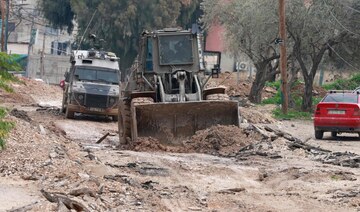AL-MUKALLA: At least a dozen Houthis have been killed in fierce fighting with Yemeni government troops during the past two days outside Marib, as the militia began a fresh round of deadly strikes to take control of the crucial city, local media reports and military officials said on Saturday.
Lt. Col. Rashad Al-Mekhlafi, a military official in the Yemen Armed Forces Guidance Department, told Arab News that the Houthis staged attacks on government soldiers with heavy machine guns, tanks and artillery along high terrain overlooking Marib in order to prepare the way for ground forces to push into new territories in Al-Akad, Al-Ramelah and other sites south of the city.
The Houthi attacks sparked heavy fighting with government troops on Thursday and Friday, resulting in the deaths of at least a dozen Houthi fighters and the wounding of dozens more.
BACKGROUND
Yemeni military officials believe that the recent Houthi assaults on Marib aimed to increase the pressure on the Yemeni government to give in to the militia’s demands, such as salary payments.
“They shelled our forces heavily before launching waves of fighters against us,” Al-Mekhlafi said.
National army and resistance fighters were able to drive the militia back, Al-Mekhlafi said, adding that many Houthi military pickup trucks were spotted transporting casualties to a hospital in Marib’s Juba as well as other hospitals in Sanaa and Thamar.
Yemeni military officials believe that the recent Houthi assaults on Marib aimed to increase the pressure on the Yemeni government to give in to the militia’s demands, such as salary payments.
Since Oct. 2, when an UN-brokered ceasefire collapsed, the Houthis have ramped up drone, missile and ground operations against government troops at several important locations around the country, including outside Marib.
Despite significantly reducing hostilities, the ceasefire that went into effect on April 2 failed to end the Houthi siege of Taiz or the cessation of the militia’s deadly attacks on civilian sections of the city.
Despite heavy Houthi casualties in Marib last week, Yemeni authorities believe that the recent attacks were weaker than those carried out during the Houthi military onslaught on the city that began early last year and was paused after the truce.
Thousands of combatants and civilians were killed during the Houthi offensive, while thousands more were forced to flee to safer locations.
On Dec. 1, the US Navy’s Fifth Fleet intercepted a fishing trawler smuggling “more than 50 tons of ammunition rounds, fuses and propellants for rockets” in the Gulf of Oman along a maritime route from Iran to Yemen.
A statement said: “Navy personnel operating from expeditionary sea base USS Lewis B. Puller (ESB 3) discovered the illicit cargo during a flag verification boarding, marking US Fifth Fleet’s second major illegal weapons seizure within a month.”
Meanwhile, in the western province of Hodeidah, an explosive-laden drone launched by the Houthis into a mosque during Friday prayers in Al-Roun village in Hays district killed two worshipers and injured three more, local media and rights groups said.
A heartbreaking photograph of a weeping mother hugging her deceased son, who was slain in the mosque, has led to outrage and condemnation of Houthi strikes.
“The Houthi gang continues to inflict suffering on every Yemeni household and family,” Basem Banani, a Hodeidah-born Yemeni journalist said on Twitter, commenting on the photograph.
Human rights group Rights Radar criticized the Houthi assault on the mosque and urged the UN envoy to Yemen to assist in protecting people from Houthi strikes.
“Rights Radar called on the UN Yemen envoy, Hans Grundberg, and the UN mission in Hodeidah to assume moral responsibility for those who have been exposed to artillery or aerial bombardment with drones and landmines as a result of Houthi attacks,” the organization said.


























